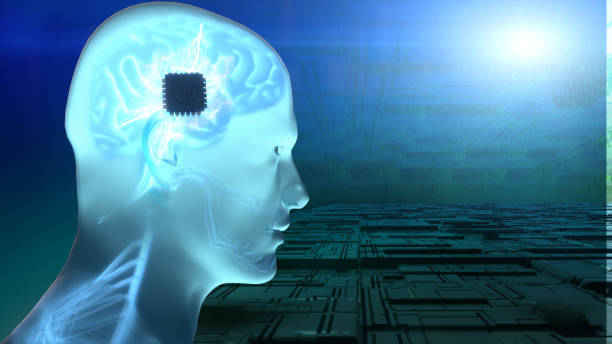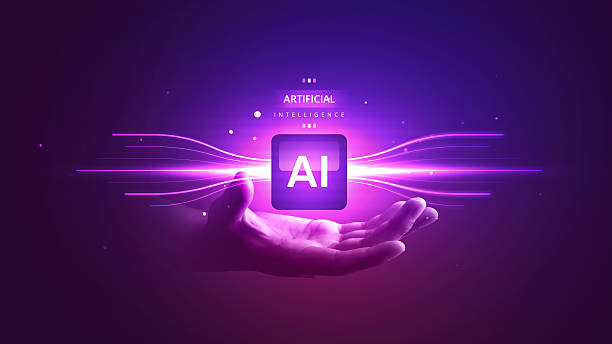What is Artificial Intelligence? Basic Definitions and Concepts

Artificial intelligence (AI), or #AI for short, generally refers to the ability of a computer system to mimic human cognitive functions such as learning, reasoning, problem-solving, and perception.
The main goal of AI is to build machines that can perform tasks that currently require human intelligence.
This broad field includes various subfields such as Machine Learning, Natural Language Processing, and Robotics.
Machine learning develops algorithms that allow computers to learn from data and improve their performance without explicit programming.
Natural language processing enables computers to understand and generate human language.
Robotics deals with the design and construction of robots that can perform physical tasks.
Artificial intelligence (AI) is currently used in many industries such as healthcare, finance, manufacturing, and transportation.
Artificial intelligence (AI) is expected to play an even more important role in our lives in the future and bring about major changes in the economy and society.
For example, self-driving cars, more accurate medical diagnoses, and smarter virtual assistants are among the future applications of artificial intelligence (AI).
Are you tired of your company’s website failing to meet your expectations? With Rasaweb, design a professional website that showcases the true face of your business.
✅ Increase new customer acquisition and sales leads
✅ Increase your brand’s credibility and trust with your audience
⚡ Get a free website design consultation!
History of Artificial Intelligence from the Beginning to Today

The history of artificial intelligence dates back to the 1950s.
In 1956, a conference was held in Dartmouth that is recognized as the official starting point of this field.
At this conference, prominent scientists such as John McCarthy, Marvin Minsky, and Claude Shannon gathered and explored the possibility of building machines with human intelligence.
In the early decades, the main focus was on Expert Systems, which attempted to model human knowledge in specific domains.
However, early advances faced challenges due to hardware and algorithmic limitations.
In the 1980s and 1990s, with the development of machine learning and neural networks, artificial intelligence (AI) regained attention.
The emergence of the Internet and the increase in data volume made it possible to train more complex models.
In the 21st century, with significant advances in hardware and algorithms, artificial intelligence (AI) has become a thriving field.
Deep Learning, which is a subfield of machine learning, has achieved very good results in areas such as image recognition and natural language processing using deep neural networks.
Today, artificial intelligence (AI) is widely used in various industries and research in this field continues.
Applications of Artificial Intelligence in Various Industries

Artificial intelligence is currently used in a wide range of industries and has created significant transformations in these areas.
In the healthcare industry, artificial intelligence (AI) is used for disease diagnosis, new drug development, and personalized medical care.
Machine learning algorithms can analyze medical images with high accuracy and identify hidden patterns.
In the financial industry, artificial intelligence (AI) is used for fraud detection, risk management, and providing smarter financial services to customers.
Chatbots built on Natural Language Processing (NLP) can answer customer questions and provide support services.
In the manufacturing industry, artificial intelligence (AI) is used to optimize production processes, predict equipment failures, and control quality.
Smart robots can perform repetitive and dangerous tasks and increase productivity.
In the transportation industry, Self-Driving Cars that use artificial intelligence (AI) for driving are being developed and are expected to play an important role in transportation in the future.
Also, artificial intelligence (AI) has many applications in marketing, education, and security.
| Industry | Applications of Artificial Intelligence |
|---|---|
| Healthcare | Disease diagnosis, drug development, personalized medical care |
| Finance | Fraud detection, risk management, smart financial services |
| Manufacturing | Process optimization, failure prediction, quality control |
| Transportation | Self-driving cars, route optimization, traffic management |
Machine Learning and its Types of Algorithms

Machine Learning is one of the most important subfields of artificial intelligence that allows computers to learn from data and improve their performance without explicit programming.
Machine learning is divided into three main categories: Supervised Learning, Unsupervised Learning, and Reinforcement Learning.
In supervised learning, the algorithm is trained using labeled data.
The goal is for the algorithm to learn the relationship between inputs and outputs and predict the outputs for new data.
Regression and Classification algorithms are examples of supervised learning algorithms.
In unsupervised learning, the algorithm is trained using unlabeled data.
The goal is for the algorithm to identify hidden patterns in the data.
Clustering and Dimensionality Reduction algorithms are examples of unsupervised learning algorithms.
In reinforcement learning, the algorithm learns how to optimize a specific goal by interacting with an environment.
The algorithm tries to find the optimal strategy by receiving a Reward or Penalty for its actions.
Artificial intelligence in games and robotics often uses reinforcement learning.
Are you losing business opportunities because of an old website? With Rasaweb, solve the problem of not attracting potential customers through your website forever!
✅ Attract more high-quality leads
✅ Increase brand credibility in the eyes of customers
⚡ Get a free consultation on corporate website design
Natural Language Processing and its Applications

Natural Language Processing (NLP), another important area of artificial intelligence, enables computers to understand and generate human language.
The main goal of NLP is to create systems that can communicate with humans in natural language.
NLP includes various subfields such as Text Analysis, Machine Translation, and Text Generation.
Text analysis enables computers to understand the meaning of text and extract important information.
Machine translation enables computers to translate text from one language to another.
Text generation enables computers to generate new text.
NLP is used in many applications such as Chatbots, Virtual Assistants, Semantic Search, and Sentiment Analysis.
Chatbots can answer customer questions and provide support services.
Virtual assistants like Siri and Alexa can respond to users’ voice commands and perform various tasks.
Semantic search allows users to find the information they need using natural language.
Sentiment analysis allows businesses to analyze customer opinions about their products and services.
The Impact of Artificial Intelligence on the Job Market and Economy

Artificial intelligence has a significant impact on the job market and the economy.
On the one hand, artificial intelligence (AI) can increase productivity and reduce costs.
Automation of processes and performing repetitive tasks by machines can help companies increase their efficiency and become more competitive.
On the other hand, artificial intelligence (AI) can lead to the loss of some jobs.
Jobs that require repetitive and automatable skills are at greater risk.
However, artificial intelligence (AI) can also create new jobs.
Jobs that require analytical, creative, and managerial skills will become more important in the future.
In order to benefit from the opportunities created by artificial intelligence (AI) and avoid its threats, it is necessary for the workforce to be prepared with appropriate training and skills.
Also, governments and organizations should adopt policies that support the sustainable development of artificial intelligence (AI) and help reduce social inequalities.
Artificial intelligence (AI) is a powerful technology that can bring about major changes in the economy and society.
By properly managing this technology, its benefits can be enjoyed and its dangers can be avoided.
Challenges and Limitations of Artificial Intelligence

In addition to its many benefits, artificial intelligence also faces challenges and limitations.
One of the most important challenges is the lack of Training Data.
Machine learning algorithms require a large amount of data for training.
In some areas, collecting sufficient training data is difficult.
Another challenge is the Interpretability of artificial intelligence (AI) models.
Some complex models, such as deep neural networks, are known as Black Boxes.
Understanding how these models arrive at their results is difficult.
This can raise concerns about the reliability and accountability of these models.
Also, artificial intelligence (AI) can lead to Bias.
If the training data is biased, artificial intelligence (AI) models will also learn this bias and produce unfair results.
Ethical Issues are also among the important challenges of artificial intelligence (AI).
The use of artificial intelligence (AI) in areas such as Autonomous Weapons and Mass Surveillance can raise serious concerns.
To address these challenges, more research is needed to develop more efficient, interpretable, and fairer algorithms.
Also, laws and regulations need to be developed for the responsible use of artificial intelligence (AI).
| Challenge | Description |
|---|---|
| Data scarcity | Need for large amount of data for algorithm training |
| Interpretability | Difficulty understanding how complex models work |
| Bias | Transfer of bias from data to models |
| Ethical issues | Concerns about misuse of artificial intelligence |
What Will the Future of Artificial Intelligence Be Like?

The future of artificial intelligence is very bright and full of potential.
Artificial intelligence (AI) is expected to play an even more important role in our lives in the future and bring about major changes in the economy and society.
One important trend is the development of Artificial General Intelligence (AGI).
AGI refers to intelligence that can perform any task that a human can perform.
Although AGI is still in the early stages of development, recent advances show that reaching this goal is possible.
Another trend is the development of Explainable AI (XAI).
XAI refers to intelligence that can explain how it makes decisions.
XAI can help increase trust and acceptance of artificial intelligence (AI).
Also, artificial intelligence (AI) is expected to make great advances in areas such as healthcare, education, and energy.
Artificial intelligence (AI) can help doctors diagnose diseases, help teachers provide personalized education, and help engineers optimize energy consumption.
Are you worried that your company’s old website will drive away new customers? Rasaweb solves this problem by designing a modern and efficient corporate website.
✅ Increases your brand credibility.
✅ Helps attract targeted customers.
⚡ Contact Rasaweb for a free consultation!
Artificial Intelligence Development Tools

The development of artificial intelligence requires the use of various tools and frameworks that facilitate the design, training, and implementation of artificial intelligence models.
TensorFlow is an Open-Source framework developed by Google and is widely used for developing machine learning and deep learning models.
TensorFlow supports the Python and C++ programming languages and enables the execution of models on various platforms.
PyTorch is another Open-Source framework developed by Facebook and is very popular among researchers and developers due to its flexibility and ease of use.
PyTorch supports the Python programming language and enables the construction of Dynamic Models.
Scikit-learn is a Python library that includes various machine learning algorithms such as regression, classification, and clustering.
Scikit-learn is a powerful tool for data analysis and building predictive models.
Keras is an Application Programming Interface (API) built on TensorFlow and Theano that allows building deep learning models using less code.
In addition, other tools such as Microsoft Cognitive Toolkit (CNTK), Apache MXNet, and Caffe are also used for artificial intelligence development.
How to Learn Artificial Intelligence? Learning Resources and Paths

Learning artificial intelligence requires having a basic knowledge of mathematics, statistics, and programming.
To begin, you can familiarize yourself with the basic concepts of artificial intelligence, machine learning, and natural language processing.
There are many online resources for learning these concepts.
Coursera and edX are two online learning platforms that offer various courses in the field of artificial intelligence.
You can also use textbooks and scientific articles to learn more advanced concepts.
After learning the basic concepts, you can do practical projects using various tools and frameworks.
Doing practical projects helps you apply your knowledge and improve your skills.
Also, participating in artificial intelligence competitions such as Kaggle can help you face real challenges and learn from the experiences of others.
In order to become an expert in the field of artificial intelligence, you need to constantly update your knowledge and be aware of the latest advances.
Following blogs, scientific journals, and artificial intelligence conferences can help you in this area.
Frequently Asked Questions
| Question | Answer |
|---|---|
| What is the definition of Hosh Masnui (Artificial Intelligence)? | It is a field in computer science that aims to create intelligent machines that can think, learn, solve problems, and make decisions like humans. |
| Mention some common AI applications. | These include self-driving cars, voice assistants (such as Siri and Alexa), recommendation systems (such as Netflix and Amazon), facial recognition, and medical diagnosis. |
| What is the difference between Narrow AI (ANI) and General AI (AGI)? | Narrow AI specializes in one specific task, while General AI possesses human intellectual ability to perform any cognitive task. |
| What is Machine Learning and its relationship to AI? | Machine learning is a branch of artificial intelligence that focuses on developing algorithms that allow systems to learn from data without explicit programming. |
| What are Artificial Neural Networks? | They are computational models inspired by the structure and function of the human brain, and are used in deep learning to process data and discover complex patterns. |
| Mention some ethical challenges related to AI. | These include privacy issues, bias in data and algorithms, job loss, and liability in the event of errors or unfair decisions. |
| What is Natural Language Processing (NLP)? | It is a branch of artificial intelligence that focuses on enabling computers to understand, interpret, and generate human language in a useful and interactive way. |
| How can AI affect the labor market? | It can lead to the automation of some routine tasks, requiring retraining of workers and creating new jobs in the areas of design, development, and maintenance of AI systems. |
| What is Computer Vision? | It is a field in AI that enables computers to “see,” understand, and interpret images and videos in the same way that humans do, enabling them to recognize objects and faces. |
| What is the importance of data in the development of AI systems? | Data is the fuel that feeds AI systems, especially in machine learning. The quality and quantity of data significantly affects the accuracy and performance of models and their ability to learn and make correct decisions. |
And other services of Rasa Web Advertising Agency in the field of advertising
Smart Brand Identity: Designed for businesses looking to improve SEO ranking by using real data.
Smart Content Strategy: An innovative service to increase user engagement by using real data.
Smart Customer Journey Map: Transform campaign management with smart data analysis.
Smart Brand Identity: A professional solution for user engagement with a focus on dedicated programming.
Smart Direct Marketing: Designed for businesses looking to analyze customer behavior through a SEO-based content strategy.
And over hundreds of other services in the field of internet advertising, advertising consulting and organizational solutions
Internet Advertising | Advertising Strategy | Advertorial Report
Resources
Applications of artificial intelligence in everyday life
,What is artificial intelligence?
,Familiarize yourself with artificial intelligence
,Introductory training on artificial intelligence
? To reach the peaks of success in the digital world, Rasaweb Afarin Digital Marketing Agency is your reliable partner with expertise in user-friendly website design and comprehensive online marketing strategies.
📍 Tehran, Mirdamad Street, next to the Central Bank, South Kazerun Alley, Ramin Alley No. 6




